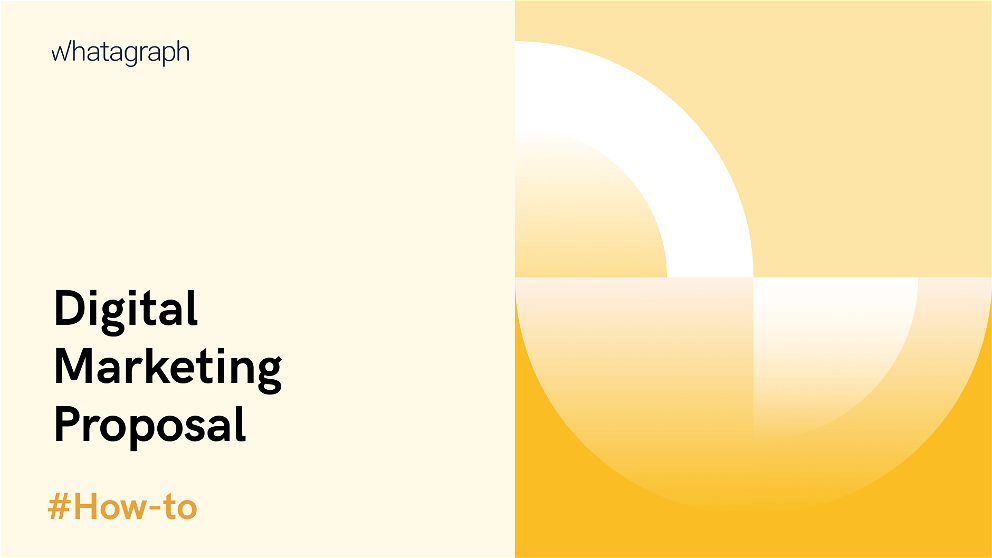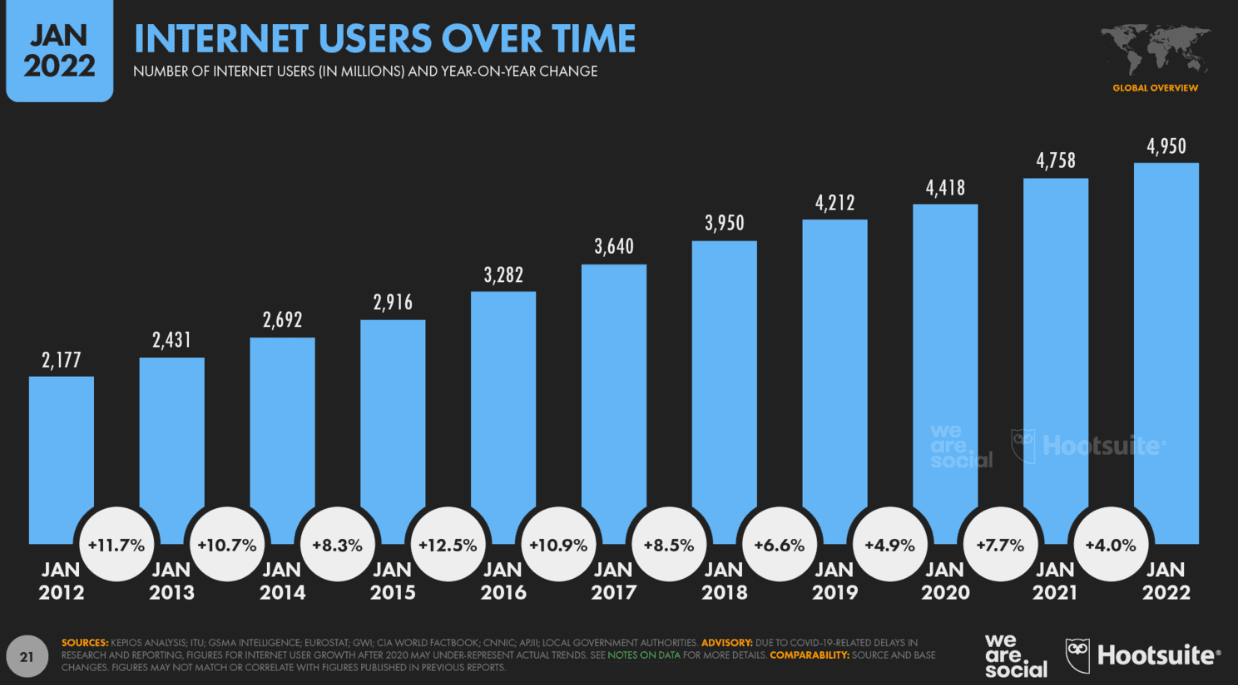How to Write a Digital Marketing Proposal And Secure Your Next Project
The digital marketing market is rising, and showing no signs of slowing down.

Nov 03 2022●10 min read

- What is a digital marketing proposal?
- What’s included in a digital marketing proposal?
- 1. Cover page
- 2. Executive summary
- 3. Goals and challenges
- 4. Marketing strategies
- 5. Scope of work
- 6. Metrics
- 7. Compelling information
- 8. Case studies
- 9. Investment and prices
- 10. Terms and conditions
- Go forth and secure your next project
- Digital marketing proposal FAQs
With a projected CAGR growth of 17.6% between 2021 and 2026, the value of this market is expected to reach $807Bn USD by 2026. For digital marketing agencies, this is an abundance of competition. The main drivers of the market include the rising number of online video and mobile advertising and the increasing adoption of real-time bidding (RTB) of online display ad slots. It also increases consumption of video ads, growing internet usage, soaring numbers of end users, and smartphone ownership.
How do you make your agency stand out from the crowd, and secure enough projects for business success in such a saturated industry sector?
You create a winning digital marketing proposal as a template for different clients. Your business’s digital marketing proposal is crucial in securing projects, and reassuring clients that your agency is the right one for the job.
In this article, we’ll look at how to create the best digital marketing proposal template - looking at aspects that make your agency unique, such as social media reporting, and other media specialisms.
What is a digital marketing proposal?
In the case of a digital marketing agency, a marketing proposal is a document for prospective clients to communicate the scope, and budget of an upcoming marketing project. This document helps clients to understand your business’s marketing strategies and alleviate any concerns they may have about taking you on as their agency.
By using a digital marketing proposal template, you’ll be able to follow a set structure but still, tailor it with specific recommendations, and suggestions for each client. You can deliver a more engaging digital marketing proposal before you interact with your client by undertaking a brief analysis of a company's industry or brand.
The two essential elements to a winning digital marketing proposal are:
- Compelling information - the vital details about why your agency is better than the competition. Including specific project goals, and how you can help achieve them. Think about what your prospective clients want to know about your services, and their pain points. Add client testimonials, short case studies, your niche, vertical, or industry, and any other information that makes your agency different (in a good way!).
Typical marketing challenges, and problems your clients may face include:
- Creating consistent, and valuable digital content.
- Managing their website.
- Handling different social media platforms.
- Driving traffic to their website.
- Improving website conversion rates.
- High website bounce rates.
- No understanding of how website visitors navigate the site.
- Inefficient processes to measure marketing results.
- Low social media engagement.
Consider these common challenges, and choose the relevant ones for each client’s digital marketing proposal.
- Operational information includes the specifics of your agency's digital marketing services. Whether social media marketing and management, SEO, website designing, or paid ads. You’ll also need to cover the cost and duration for each service, and any packages you provide.
Why is a digital marketing proposal important?
A digital marketing proposal is essential for digital marketing agencies to demonstrate service examples as a comprehensive guide. The scope of services, conversion optimization, and reporting is typically pitched through a proposal, which includes previous marketing projects.

What’s included in a digital marketing proposal?
Before you begin writing your proposal, consider some of the most critical elements to include to make a great first impression. These include:
- An eye-catching cover page design.
- An executive summary detailing the discovery session results.
- The client’s goals and challenges - and your solutions.
- An explanation of the marketing strategies you plan to implement to reach the client’s goals.
- The scope of work in a summary format. For example, in an SEO proposal, you'd list of on-page and off-page improvements that should boost the client's ranking.
- A metrics section - detailing how you’ll measure the success of your marketing campaigns.
- The aforementioned compelling information - specifying why you’re the best agency.
- A case studies section demonstrating proof of success.
- Investment, and price information.
- Terms and conditions - including a place for your client to e-sign.
Using a digital marketing commercial template can help make things quicker and easier. All design elements are taken care of so you only need to focus on including the correct information in the right section.
1. Cover page
From the get-go, you want to convey that your digital marketing agency is professional. To do this, ensure that you choose an attractive (i.e., eye-catching) and bold cover page with your prospect’s brand on it—with no spaces or breaks in between words. This will immediately show them what type of company they’re dealing with: one that knows its stuff! You can use a royalty-free icon as well if needed; otherwise simply choosing a clean and modern look will suffice.
2. Executive summary
This section is where you’ll detail the information you’ve gleaned so far from the prospective client. Your executive summary must capture the reader’s attention, and encourage them to read the rest of the proposal. Data such as a high-level view of the business’s goals, budget, and timescales, and a summary of the critical points of the project. Use your executive summary to express how much you’d appreciate their business, and why they should sign up with your agency.
Hopefully, you’ll have covered essential points during your initial discovery session, and have the answers to the following:
- What resources do you currently have to meet your digital marketing goals?
- What obstacles have prevented you from reaching your digital marketing goals?
- Are you measured on any metrics in terms of digital marketing results?
- What are your revenue goals for the upcoming year?
- Does the business have other priorities that might take the emphasis away from reaching these goals?
3. Goals and challenges
Use this section to highlight the plans, goals, and challenges in more detail, together with the business’s current position in the market. Emphasize the cost of inaction to the business, and why they seek digital marketing services.
Any digital marketing proposal is rooted in the client's needs, and works to your advantage by highlighting your prospect’s problems. Remember - you're sending your proposal because your agency’s solutions can solve their pain points.
A compelling digital marketing proposal implies that your agency initially understands why the prospect sought marketing advice. It’s crucial to convey this understanding to gain potential customers’ trust. Many prospective clients won’t even know the core cause of their problems. Your job is to show them exactly why things aren't currently working for them, and how you’re going to fix them.
4. Marketing strategies
Here, you’ll list the digital marketing strategies you plan to use to solve the business’s challenges. Just outline the initial projects with the monthly services provided for a retainer-based approach. This approach might look like this:
Monthly retainer deliverables:
- Landing page
- X blog articles
- Calls-to-action
- Social media content promotion
- Design and creation of one whitepaper per month
- Email newsletter
- Monthly website and social media reporting
- Email marketing
Upsell monthly deliverables:
- Sponsorships
- Sales enablement content
- PPC adverts
- Call tracking and nurturing
- Ecommerce website integrations
- Sales and marketing alignment services
If you have a process you follow with all new clients, consider outlining a roadmap for the first six months. Then you can add on different upsells, such as ecommerce SEO audits, and extra information relevant to each new prospective client.

5. Scope of work
For the scope of work, add a summary of the different services you will provide to the client. Detail the timelines, tasks, responsibilities, and milestones if relevant. A thorough scope of work is crucial as you’ll be less likely to fall foul of dreaded scope creep. Include specific marketing collateral you plan to create for your prospective client for each stage, such as:
- Brand awareness to increase their digital presence.
- Specifically targeted pieces of content to drive traffic to the business website.
- Lead generation tactics to garner customers’ information.
- Social listening campaigns to understand customers and the market better.
6. Metrics
During the discovery phase, you may have found out the current state of the decision maker’s marketing priorities. If so, this metrics section highlights some benchmarking data, especially if this is for a lead generation campaign or a website relaunch.
Highlight proposed goals and metrics to achieve by certain dates. This looks like:
- Increase email subscribers by x%
- Increase leads by x%
- Improve sources of leads
- Improve outbound marketing email open rate
- Increase sales qualified leads
7. Compelling information
The following few sections are aimed at external stakeholders.
Up to this point, you’ve reinforced your understanding of the client’s current marketing needs, and outlined your plan. Now is the time to establish trust. You can include information about your team, and why they’re ideal for working with your prospect. Think along the lines of information about your company culture, and values. Be sure to add all the other relevant internal and external collaborators you work with who will work on their projects, such as copywriters, SEO experts, and video services. If you think it’s appropriate, include information on marketing tools that your team uses to manage operations efficiently.
8. Case studies
Pick the most relevant case studies to your prospect so they can relate to similar business models, and the success they’ve achieved by working with your agency.
9. Investment and prices
The only thing to bear in mind about this section is to be clear about your pricing in the marketing proposal for a B2B SEO marketing strategy - especially about any additional work. If you offer premium package services, be clear about your explanation of this, and how it saves businesses money by investing in digital marketing for the longer term. Display your pricing information in an easy-to-read grid. Add distinctions for different, plans, and highlight the superior plan in a different font or color. You can also use a fun font for this.
10. Terms and conditions
Lastly, consider if you need to include legal language to establish the terms of your business, and project. This should cover the rules that govern your relationship with the client, such as payment terms, a notice of cancellation, intellectual property transfer, confidentiality, and data. The best practice here is to enlist the help of a legal professional or contract management software.
Consider adding the final contract - together with somewhere they can e-sign - in the proposal to speed up the process. This ensures that once the client is ready to sign, they have everything they need to close the deal.
Go forth and secure your next project
The best digital marketing proposal effectively introduces your agency’s services, establishes your agency’s unique selling points and competitive advantage, and works to secure successful projects.
You need to have a repeatable process for scaling operations as an agency. And with a killer digital marketing proposal, that’s what you have as the ideal foundation for each proposal. Nailing down the key areas as we’ve done in this article will set you off on the right track. Then, it's just a case of filling in the gaps with the most relevant prospect information and customizing it to their business’s requirements.
Why not use quoting software to make the process even easier? Some software features enable prospective clients to type comments on the proposal, and your agency will receive notifications immediately for instant action. Discover proposal software that integrates with your CRM for speedy proposal creation that removes manual data entry errors.
Show your prospects that your agency cares, and is ready to hear from them by writing a winning digital marketing proposal template. You’ll be in the best position to leverage a great working relationship.
Digital marketing proposal FAQs
How many pages should a digital marketing proposal be?
For multi-page digital marketing proposals, try and keep them to under 15 pages if possible - this is not War and Peace. Remember that you can also create one-page versions of your proposals to share with specific stakeholders.
What makes a good marketing proposal?
An excellent digital marketing proposal is particular to customers' needs, and identifies their pain points for a specific digital marketing funnel. Always add your agency’s unique talents, and tailor each proposal directly to each customer.
How do I close a digital marketing proposal?
Close off by thanking the potential client for their time reading your proposal, and expressing how much your agency is looking forward to working with their business. A solid call-to-action is asking them to contact you to discuss it further, or inviting them to ask additional questions that they may have.
Author: Yauhen Zaremba - Director of Demand Generation
Yauhen is the Director of Demand Generation at PandaDoc. He’s been a marketer for 10+ years, and for the last five years, he’s been entirely focused on the electronic signature, proposal, and document management markets. Yauhen has experience speaking at niche conferences where he enjoys sharing his expertise with other curious marketers. And in his spare time, he is an avid fisherman and takes nearly 20 fishing trips every year.

WRITTEN BY
Mile ZivkovicMile is the ex-Head of Content at Whatagraph. A marketing heavy with almost a decade of SaaS industry experience, Mile has managed multiple content marketing teams without losing an ounce of his writing passion.

